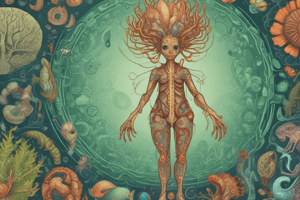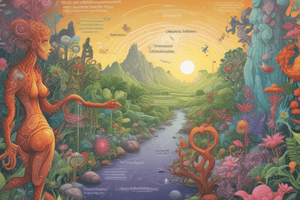Podcast
Questions and Answers
Which of the following best describes biological organisation?
Which of the following best describes biological organisation?
- The interaction between organisms and their environment.
- The genetic makeup of an organism influencing its structure.
- The specialized and coordinated parts in living things that contribute to function. (correct)
- The random arrangement of cells in organisms.
What is the primary purpose of respiration in living organisms?
What is the primary purpose of respiration in living organisms?
- To absorb nutrients from the environment.
- To facilitate external and internal communication.
- To release energy from glucose. (correct)
- To synthesize new organic compounds.
Which characteristic of life involves the ability to eliminate waste products?
Which characteristic of life involves the ability to eliminate waste products?
- Growth
- Reproduction
- Excretion (correct)
- Respiration
Which of the following statements accurately reflects the characteristic of response in living organisms?
Which of the following statements accurately reflects the characteristic of response in living organisms?
What does the characteristic of growth entail in biological terms?
What does the characteristic of growth entail in biological terms?
Which of the following processes in living organisms is primarily associated with producing energy from nutrients?
Which of the following processes in living organisms is primarily associated with producing energy from nutrients?
What does the characteristic of reproduction in living organisms primarily enable?
What does the characteristic of reproduction in living organisms primarily enable?
Which statement best encapsulates the importance of organisation in living organisms?
Which statement best encapsulates the importance of organisation in living organisms?
Which characteristic of life is primarily concerned with an organism's adaptation to environmental changes?
Which characteristic of life is primarily concerned with an organism's adaptation to environmental changes?
What is the main outcome of the excretion process in living organisms?
What is the main outcome of the excretion process in living organisms?
Flashcards are hidden until you start studying
Study Notes
Definition of Biology
- Biology is the scientific study of living organisms and their interactions with the environment.
Characteristics of Life
- Organisation: Living things possess specialized systems and cells that work together for a common function.
- Respiration: Involves metabolic processes that release energy from glucose, crucial for sustaining life.
- Growth: Describes the capacity of an organism to increase in size and develop through different life stages.
- Excretion: The process of eliminating waste products generated from metabolic activities to maintain homeostasis.
- Reproduction: The biological mechanism by which organisms produce offspring, ensuring the continuation of their species.
- Response: The ability of organisms to sense and adapt to changes in their surroundings, facilitating survival.
Detailed Explanations of Characteristics
- Organisation: Encompasses the cellular structure and functional specialization in organisms, enabling complex biological processes.
- Respiration: Essential for energy production, respiration can occur aerobically (with oxygen) or anaerobically (without oxygen).
- Growth: Involves not just size increase but also differentiation and development, allowing organisms to mature into their adult forms.
- Excretion: Key for detoxifying the body, excretion involves organs such as kidneys in animals, ensuring metabolic waste removal.
- Reproduction: Can be sexual or asexual, contributing to genetic diversity or stability within populations.
- Response: Includes physiological and behavioral changes in response to stimuli, critical for survival and adaptation.
Definition of Biology
- Biology is the scientific study of living organisms and their interactions with the environment.
Characteristics of Life
- Organisation: Living things possess specialized systems and cells that work together for a common function.
- Respiration: Involves metabolic processes that release energy from glucose, crucial for sustaining life.
- Growth: Describes the capacity of an organism to increase in size and develop through different life stages.
- Excretion: The process of eliminating waste products generated from metabolic activities to maintain homeostasis.
- Reproduction: The biological mechanism by which organisms produce offspring, ensuring the continuation of their species.
- Response: The ability of organisms to sense and adapt to changes in their surroundings, facilitating survival.
Detailed Explanations of Characteristics
- Organisation: Encompasses the cellular structure and functional specialization in organisms, enabling complex biological processes.
- Respiration: Essential for energy production, respiration can occur aerobically (with oxygen) or anaerobically (without oxygen).
- Growth: Involves not just size increase but also differentiation and development, allowing organisms to mature into their adult forms.
- Excretion: Key for detoxifying the body, excretion involves organs such as kidneys in animals, ensuring metabolic waste removal.
- Reproduction: Can be sexual or asexual, contributing to genetic diversity or stability within populations.
- Response: Includes physiological and behavioral changes in response to stimuli, critical for survival and adaptation.
Studying That Suits You
Use AI to generate personalized quizzes and flashcards to suit your learning preferences.



